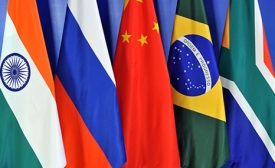brazil
Backed by its gastronomy, martial arts, music and manga culture, Brazil's small but influential Japanese community is wielding soft power to assert ethnic pride and preserve century-old ties..."the main objective, beyond the preservation of the Japanese culture, is furthering the integration of the Japanese and broader Brazilian communities."
"Soft" power looks like a different story but, to take two examples, Brazil has signed no trade deal since the mid-1990s and its quest for a permanent seat at the UN Security Council has been an abject failure, gaining little support from fellow ...
...cultural diplomacy between our state and Brazil will be engendered for the purpose of exploring our tourism sector for the collective benefits of our people in terms of economy and historical values.
Continuing their blistering critique, diplomats vented that Brasilia was merely interested in currying favour amongst African nations so as to shore up its own bid for a permanent seat on the United Nations Security Council. Brazil...was "more concerned with counting heads for UNSC reform... than in being a champion of Africa's interests, supporting African peacekeeping or augmenting trade."

Sherine B. Walton, Editor-in-Chief
Naomi Leight, Managing Editor
Kia Hays, Associate Editor
Dilma doing a cameo in a Spike Lee joint, and spotlighting human rights violations. Lula rolls out a new Facebook page and gets tagged at an arts crawl with Dilma. It's all part of the cultural public diplomacy designed to make those who say "they don't care about us" say Go Brazil, Go! before the World Cup and the Rio Olympics.
Needless to say, the tone and direction of branding a nation emanates from its top executive or CEO. This is the individual who by being the President, King or Prime Minister of a country carries on his shoulders the unique and challenging responsibility of inspiring citizens towards positivism
Winners and losers in the "social equality" game depend on how public diplomacy is used to shape world opinion. Turning up the volume, Brasilia successfuly played the sanctions card against the United States to win a quarter-billion-dollar World Trade Organization (WTO) settlement over illegal Washington cotton subsidies.







